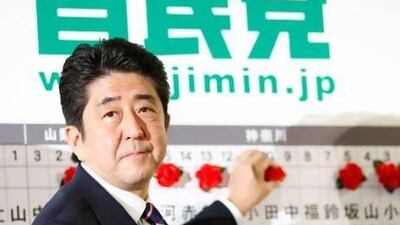TOKYO // Japan's Shinzo Abe may be thoroughly modern when it comes to pitching his policies on a widely followed Facebook page, but his conservative agenda for shedding the shackles of postwar pacifism is one that he learnt at his grandfather's knee.
The dapper, soft-spoken Mr Abe first took office in 2006 as Japan's youngest prime minister since the Second World War. But he quit suddenly after a year plagued by scandals in his cabinet, public outrage at lost pension records and a big defeat for his Liberal Democratic Party (LDP) in an election for parliament's upper house.
With a hawkish Mr Abe again at the helm, the LDP - ignominiously ousted in 2009 - swept to victory in yesterday's poll for parliament's powerful lower chamber.
NHK television, citing forecasts based on its own exit polls, said the LDP had won 275 to 310 seats in the 480-seat lower house, with the Democratic Party of Japan reduced to a rump of between 55 and 77 seats.
"I have experienced failure as a politician and for that very reason, I am ready to give everything for Japan," Mr Abe wrote in a recent magazine article, referring to his September 2007 resignation, which he blamed on a chronic intestinal ailment.
Mr Abe, 58, hails from a wealthy political family that included a foreign minister father and a great-uncle who served as premier. But when it comes to policies, his grandfather, the late prime minister, Nobusuke Kishi, seems to have mattered most.
"If one lists the many problems Japan faces ... they all stem from one root cause," Mr Abe wrote.
"Haven't we put off problems without clarifying Japan's will to protect the lives and assets of its people and territory with its own hands, and merely accepted the benefits of economic prosperity?" asked Mr Abe, who wants to loosen the limits of Japan's post-Second World War pacifist constitution.
Kishi Nobusuke, a wartime cabinet minister who was jailed but never tried as a war criminal after the Second World War, served as prime minister from 1957 to 1960, when he resigned after a public furore over a renegotiated US-Japan security pact.
Five years old at the time, Mr Abe famously heard the sound of violent clashes between police and leftist crowds protesting against the pact outside parliament as he played on his grandfather's lap.
Mr Kishi tried without success to revise Japan's US-drafted 1947 constitution, become an equal partner with the US and adopt a more assertive diplomacy - all central to Mr Abe's agenda, both in 2006 and today.
Mr Abe often speaks of "escaping the postwar regime", a legacy of the US occupation that conservatives argue deprived Japan of national pride and weakened traditional mores.
"I have not changed my view from five years ago when I was prime minister that the biggest issue for Japan is truly 'escaping the postwar regime'," Mr Abe wrote.
First elected to parliament in 1993 after his father's death, Mr Abe rose to national fame by adopting a tough stance towards North Korea, Japan's unpredictable neighbour.
More recently, he has promised not to yield in a territorial row with China over tiny islands in the East China Sea and boost defence spending to counter Beijing's growing clout.
He also wants to recast Japan's wartime history in less apologetic tones, and in April visited the Yasukuni Shrine, seen in much of Asia as a symbol of Japan's past militarism.
Whether Mr Abe, who is also prescribing radical monetary policy steps to beat deflation, will stick to his ultraconservative agenda once in office is a matter for debate.
Sceptics wonder if pragmatism will trump ideology this time. "He's been two Abes - pragmatic and ideological," said Richard Samuels, director of the Centre for International Studies at the Massachusetts Institute of Technology in Boston. "It's going to be much harder for him to be pragmatic than before. The general public is in a less conciliatory mood than in 2006. Positions have hardened."
Whether Mr Abe has matured enough to become a more competent leader remains to be seen. Critics said his first term was characterised by a cabinet filled with close friends and they worry he may fall into the same trap this time, too.
* With additional reporting by Agence France-Presse

